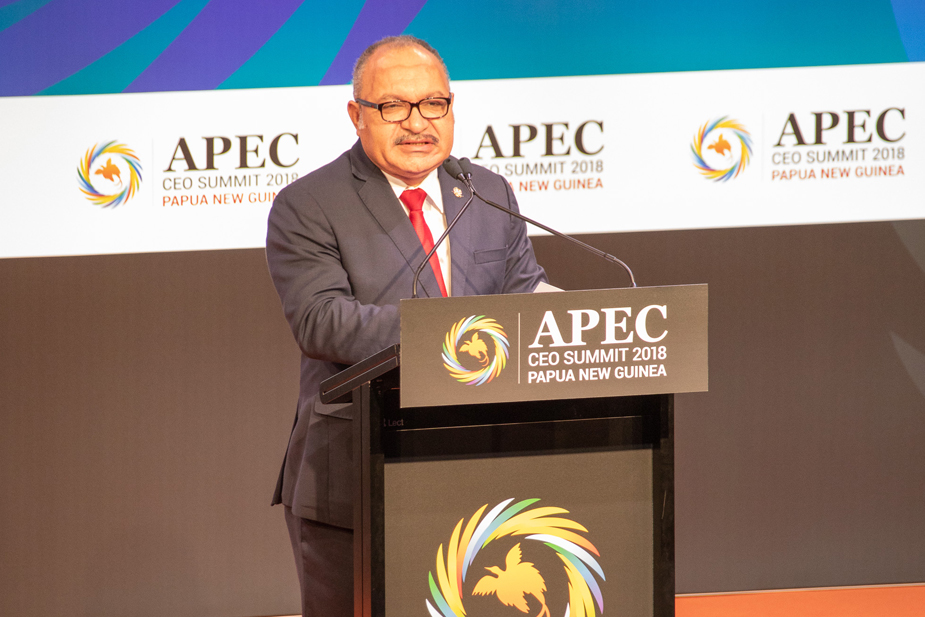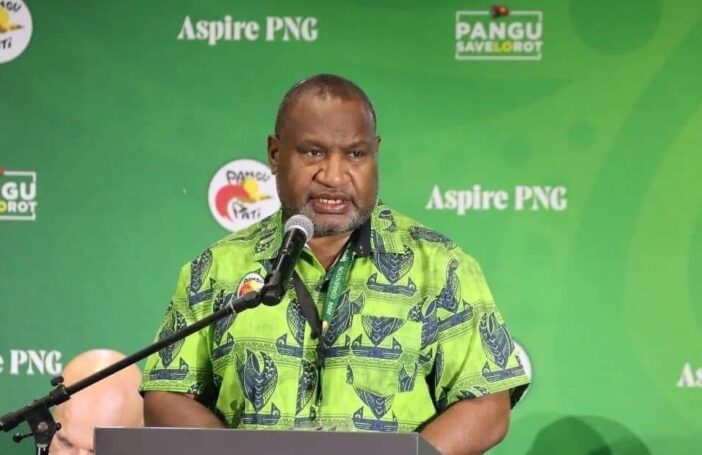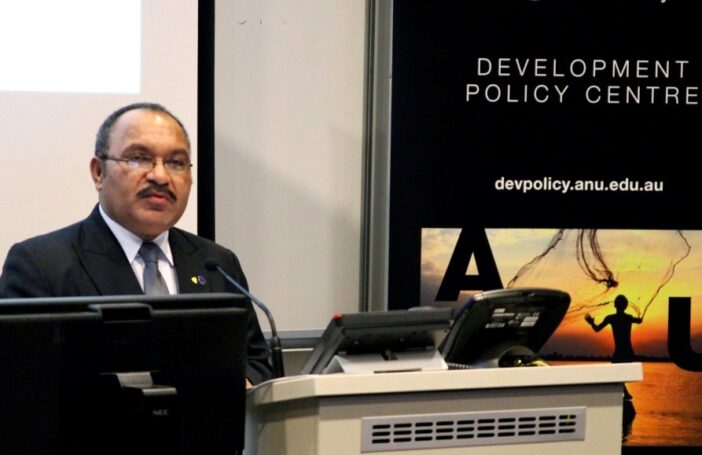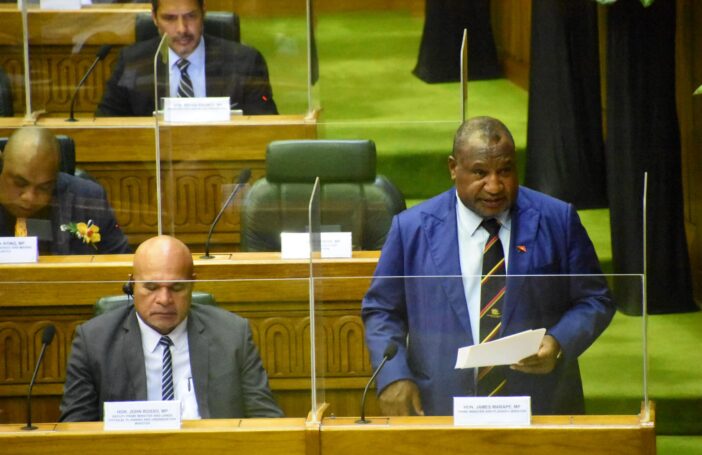The almost seven years stability enjoyed by Papua New Guinea’s (PNG) government of Prime Minister Peter O’Neill is now under challenge as the country prepares for a gripping vote of no confidence in late May. Some have already shared key insights on the developments, including some historical background and technical aspects of the vote of no confidence process (see here, here and here). This analysis builds on these discussions to draw some general observations regarding the present political climate in PNG and possible future implications.
Impetuses to change the O’Neill government
Up until Tuesday of last week, Peter O’Neill was the dominant political player in PNG politics. He assumed the position of Prime Minister in August 2011 after ousting Sir Michael Somare in a dramatic power struggle that included resisting judges of the Supreme Court. The 2011 constitutional crisis cemented O’Neill’s place among his peers as an experienced combatant of the country’s hostile politics. Within the region and abroad, his elevation and Somare’s demise was seen as the ‘changing of the guard’ in PNG politics.
One of O’Neill’s key reforms following his ascension was the establishment of Investigative Task Force Sweep (ITFS) – an intra-governmental agency charged with combatting corruption. The successes of ITFS resulted in widespread public support for O’Neill. However, his standing quickly unravelled in 2014 when he became the subject of an investigation into the famous ‘Paraka-gate Affair’, a case of alleged high-level corruption. His staunch resistance and interference in the investigative processes – in particular, his dismantling of ITFS – raised serious questions about his commitment to the rule of law.
Nevertheless, O’Neill maintained commanding support in Parliament. In Australia, he was dubbed as “PNG’s champion of progress”, a call that would later appear misguided as O’Neill’s leadership led the country into severe economic and fiscal difficulties. His government borrowed heavily from foreign lenders to sustain its ambitious policies and projects, including hosting international events such as the Pacific Games and the Asia Pacific Economic Cooperation (APEC) meetings at exuberant cost.
These issues finally and suddenly resulted in the mass exodus of senior ministers, coalition partners and members of O’Neill’s political party over the last two weeks to the Opposition. The first sitting on Tuesday 7 May exposed, for the first time in O’Neill’s dominating prime ministerial career, the real possibility of being unseated, as the Opposition put forward 50 MPs against O’Neill’s 56 MPs. Unlike in the past, O’Neill now maintains only a slim majority, and a small margin provides no confidence at all in a notoriously fluid political environment.
Future possibilities and implications
The 26 MPs that defected from the O’Neill government demonstrate a serious lack of confidence in the Prime Minister. That these MPs are putting conscience before convenience and principles before perks is likely to inspire other MPs in the O’Neill government to defect. O’Neill, however, may counter that likelihood by using various methods of attraction, one of which, according to former Prime Minister Sir Julius Chan, is to “keep individual politicians ‘happy’”.
Those who defected, especially Finance Minister James Marape, and Governors Sir Peter Ipatas, Phillip Undialu and William Powi, are from the resource-rich Enga, Hela and Southern Highlands provinces. Their defection may present a challenge for resource developers in these provinces. The investors rely on local leaders to overcome complexities such as dealing with landowner issues, so the defection of these local leaders is likely to affect the confidence of investors in the O’Neill government.
The motion of no-confidence comes at a time of increased bilateral and multilateral engagement with traditional and non-traditional partners. The hosting of APEC reinforced PNG as a regional leader and presented O’Neill’s government as stable and enduring. However, the motion of no-confidence, supported by several members of O’Neill’s own political party and senior Cabinet ministers, portrays a contrary image of Prime Minister O’Neill internationally.
Parliament was abruptly adjourned to Tuesday 28 May, which, according to the Opposition, is a political tactic to delay the vote of no confidence. However, given that the vote of no confidence is now filed, it triggers a constitutional urgency. Unlike other ordinary parliamentary motions, the vote of no confidence needs to be dealt with by the Parliament at the earliest possible time. There is ample Supreme Court precedence to support the Opposition applying to the Court to possibly bring the Parliament sitting forward.
Security is likely to heighten around Port Moresby as political uncertainty looms over the embattled city. The Speaker of Parliament needs to guard against any compromise and the democratic processes of the vote of no confidence needs to be strictly followed to prevent any adverse situations among the disgruntled population.
Conclusion
In PNG – the ‘land of the unexpected’ – it is difficult to predict an outcome of the impending vote of no confidence. The defection within O’Neill’s government suggests that if the normal parliamentary processes are strictly followed, O’Neill may suffer defeat, as some within his party may not be as loyal as they appear.
The nomination of the former Finance Minister, James Marape, as the alternative Prime Minister is an indication of the changing of the guard in PNG politics. His reputation is not without question, but he presents a strong challenge to O’Neill given his previous senior ministerial portfolios, as well as his influence among the different factions in the Opposition. While the future is unpredictable, it appears promising as leaders forgo privileges and perks to rally for change.






I believe Bal Kama’s report here is based on media reports only and his report have not cited from actual reliable source. What he presented here is the same narration which the opposition had originated.
The real scenario here is that the senior ministers just defected from PNC led government was because they have not been served their request by O’Neill to satisfy their personal needs and not actually for people.
The same people are moving here and there and there won’t be any solution . Our Constitution governing our leaders are wick and can be manipulated by them.(Politicians) .
Even a new Government is formed they will continue to fall victim of or existing laws.
Our Constitutions needs to be reviewed and overhaul. Our Constitutions are colonial once and are outdated. Any Nations to prosper at a fast rate , only will depend tougher laws to govern.
Today you see politicians move around freely like stray dogs who have no control. We need to tighten our laws on musrooming political parties. A small nation with too many political parties which brings confusion to citizens during elections. We must have less then Five political parties with clear policies so our people will be in a better position to understand it’s policies and vote.
Laws governing DSIP funds should also be tighten to enable delivery of goods and services. Up untill today we don’t have proper check and balance on the disbursement of K10 million anually. In a full five year term a politician is paid K50 million as DSIP funds but very little is done. All the money sits in MPs account because there is no proper check and balance on all MPs.
Fake acquittals are done and polish to attract new funds. Acquitals are blindly received and signed and new funds are released. No officers are assigned to g9 into electorate to physically check and confirm whether the acquitals truly worth the development on the ground.
Also constitution governing other areas of heads of departments implementing government policies should also be tighten so service deliever y is very effect. Generally , government did it’s part to allocate funds but funds interms of developments failed and our people are suffering. Our
country’s Constitutions needs complete overhaul to give clear vission to our leaders to have fear in our constitutions and execute their duties beyond our expections to bring our nation forward.
There’s still the question on why the MPs decided to leave now, and not earlier? Have they suddenly developed a higher moral compass while O’Neil was in China? The corruption, economic mismanagement, O’Neil’s one man show, etc., are not new. The defecting MPs were content to support O’Neil in the past 7 years with these accusations directed at the government. They even supported O’Neil in the 2016 VONC when issues such as Parakagate and UBS loan were very much fresh. The problem the opposition will have if they are successful, is that they cannot investigate much of the issues they claim are wrong as some of the defecting MPs were implicated in the issues.
VONC in PNG is an expression of struggle between two factions to gain access to state resources, which by logic of a Westminster system, is controlled by the executive side.
I seriously wish I could believe this:- “That these MPs are putting conscience before convenience and principles before perks is likely to inspire other MPs in the O’Neill government to defect”….. Bal Kama, see above in this article. Right now, this sounds far too idealistic and far from the truth. The painful reality is not the horse trading going on between the Opposition and the Government, but the trading that is going on within each group. And this is going on within the so-called moral Opposition. And therein lies the ugly face of corruption smiling before it possibly becomes the new Government. This is the same old same old well worn VONC political move that happens all the time. Remove one set of corrupt politicians for another set of corrupt government politicians. Nothing unexpected about this. Goes on all the time with the VONC. Also nothing unexpected about the HOPE which we all hold with bated breath as that VONC goes ahead. How so very sad! From a country that had so much promise 40+ years ago. Maybe we need new thinking around our voting system; new thinking about what constitutes a political representative (get rid of the “leader” mentality); new thinking about how to move forward in spite of the fact that our politicians have always been corrupt since the early 1980s and given that a VONC is simply a constitutional “windfall” strategy for another set of ambitious politicians to get to the pot of gold. Can some of you great thinkers start to think outside of the political square and come up with something that could, maybe just could, work for PNG. Instead of yet again another “windfall” played out through the VONC while citizens of PNG burn.
Thanks Bal for this commentary
The leadership of PM Peter O’Neill is likely to face continuous backlash leading into the possible motion of non-confidence vote (VoNC) later this month.
The deferment of two weeks normal Parliament sitting time on May 07 to May 28 is actually seen as a tactical approach to avoid the motion if it goes through the normal process. This is not a new approach since PM O’Neill has been doing the same in the previous sittings when a VoNC is looming.
What is different now than the previous political development leading to a possible VoNC is very critical. Now we saw a mass exodus of senior MPs including ministers leaving the O’Neill Government. They claim that the PM is “running a one man show”, in most cases bypassing and breaching normal government processes and regulations and lack of consultations.
The PNC as the ruling party has 46 members originally and now it has reduced down to 28, and this has demonstrated that there is strong resentment in the PNC party led by Peter O’Neill. In addition, senior ministers in government have resigned. Not only that, three Governors from O’Neill’s tribal ethnic Provinces left him including his own Governor of SHP.
Now PM Peter O’Neill is facing a serious problem on all fronts: in the PNC party, in the NEC, in the tribal Provinces that he originally garnered support. On top of these is the looming VoNC motion, but if he survives the VoNC the PM still need to mend the rest of the problems.
Whilst considering that, Peter O’Neill is the CEO of a country and he needs to live up to that expectation. Should he bored down with sorting in-house matters or stand bold and address the needs of the country.
The opposition team are boastful of its 50 strong team and will continuously fight to achieve one mission. That is to remove Peter P. O’Neill from the PM post so that the “one-man show” syndrome can be put to rest.